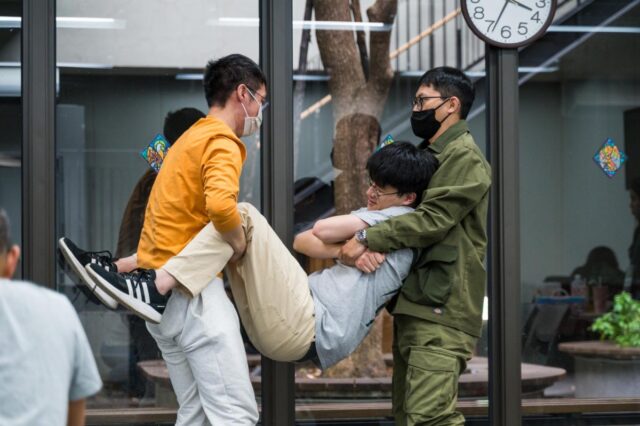
Civil Society Defense Initiatives
Publication: China Brief Volume: 24 Issue: 4
By:

Executive Summary:
- Civic groups are enhancing “social resilience” by forming self-training organizations focused on preparing for potential conflict impacts beyond just military engagement.
- These groups address a broad range of issues including civil defense, emergency rescue, disaster preparedness, cyberattack responses, and infrastructure maintenance. Civil society advocates for the use of civilian technologies in defense, such as drones and AI, reflecting a proactive stance on Taiwan’s security.
- Kuma Academy exemplifies practical action in civil defense education, offering courses and activities to thousands, alongside other groups focusing on specific preparedness aspects.
- Taiwan’s civil society is urging government and political parties to implement defense reforms, over concerns about the country’s level of defense in the face of threats from the PRC.
Taiwan’s government must actively respond to the increasingly serious and ill-intentioned threats and provocations coming from the People’s Republic of China (PRC). Taiwan’s civil society should also be deeply concerned.
In recent years, more and more civil society groups have begun to pay attention to the issue of Taiwan’s defense. These groups, which include political and social groups, and even academic groups, have been actively urging the government and political parties to carry out defense reforms in areas such as mobilization, the development of new technological applications, and responses to cognitive warfare. Taiwan’s civil society has now progressed beyond discussion and debate, and has begun to devote itself to putting active participation into practice.
Citizens’ Organizations Starting From the Perspective of Enhancing “Social Resilience”
The most obvious manifestation of civil society taking the initiative is in the variety of civic self-training groups and organizations that have begun to flourish across Taiwan in recent years. Drawing on the experiences of similar groups in current geopolitical hotspots, Taiwan’s groups have examined the challenges that they may face in the event that current threats of conflict are realized. They have found that war may not be a remote prospect for Taiwan, and have come to believe that contemporary warfare does not just affect the state’s military and defense sectors. Rather, society as a whole faces a broad range of challenges.
In modern warfare, perhaps less than 10 percent of the population serves directly on the front line. However, the impact of war is felt by all in society. People therefore must consider how society as a whole can respond and adapt to the challenges and developments of a contemporary pattern of warfare in which conflicts can extend into the longer term. Clearly, this requires more than arranging for emergency or temporary military mobilization.
Society needs extensive adjustments and construction. Only then will it be able to cope on a socioeconomic—and even psychological—level with a possible destructive assault, with survival following such an extraordinary situation, with reestablishing stability and restoring the functioning of society, and subsequently with continuing to live and develop in order to sustain the country in the face of a war. In other words, enhancing society’s ability to deal with and recover from attacks, and strengthening its ability to withstand crises, have become a key focus for civil society. This is what is referred to as the issue of “social resilience (社會韌性).”
Participation Practices of Various Self-Established Organizations
Under the current circumstances, a wide range of citizen groups concerned with defense issues have emerged independently. In addition to traditional issues of military defense, these groups also touch on a variety of subjects and practices of great importance to the construction of social resilience. These include: civil defense, emergency rescue, disaster preparedness, cognitive psychology development, responses to cyberattacks, and infrastructure maintenance. Broadening awareness and discussion of issues through extensive communication and education is the original and primary goal of Taiwan’s current civil society. However, an increasing number of organizations are now focusing on practical action and training.
Kuma Academy (黑熊學院) is one such organization. Established in September 2021, it began with civil defense programs centered on defense knowledge and awareness. Through the introduction of basic knowledge and training, it actively promotes education and drills throughout Taiwan (Kuma Academy, accessed February 14). Basic courses include Modern Warfare Awareness, Understanding Cognitive Warfare, Basic Hygiene and Rescue Training, and Evacuation Planning and Preparedness. In addition, the Academy offers online courses, sells publications and related materials, and organizes parent-child activities to promote civil defense knowledge. To date, tens of thousands of people have engaged with and participated in Kuma Academy programs and activities.
Taiwan has a variety of other civic groups that focus on specific issues (for instance, first aid training or self-defense awareness). A further set of self-training groups organize activities at the local or even neighborhood level. Although these groups’ issues of concern vary in emphasis, they are all part of a spontaneous effort by citizens to build social resilience and prepare for the possibility of facing an external threat.
Conclusion
Due to the limitations of Taiwan’s legal environment and institutional regulations, training and organization for civilians to directly handle weapons is still only at the discussion stage. However, Taiwan’s civil society is actively advocating for and participating in discussions over civilian technologies or new technologies that could be used in a war or during an attack. These include the development and utilization of dual-use drones, AI technology, internet applications, open source intelligence collection, and even technology to counter hacking or cognitive-psychological threats. These constitute the concerns and responses of Taiwan’s civil society in the face of emergent threats. At the same time, they signify the on-the-ground implementation of initiatives in the context of Taiwan’s unusual defense environment.




